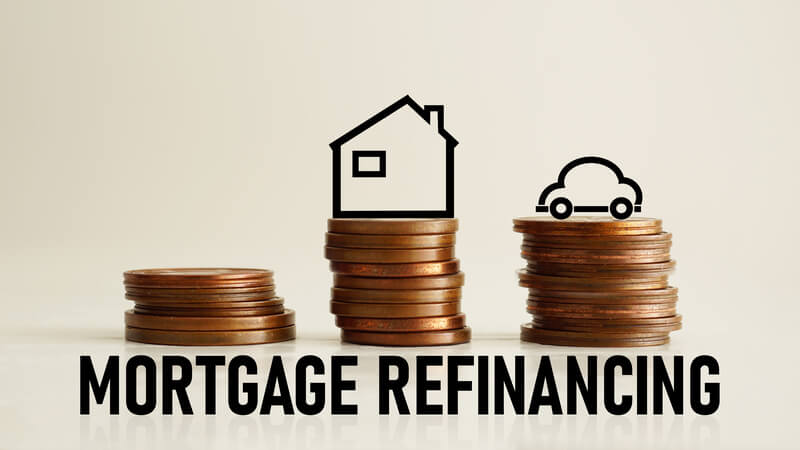What Happens If I Can’t Refinance After Divorce? With a refinance loan, you can take complete financial responsibility for the house you once owned with your spouse and pay off your shared mortgage. In case you want to keep the house after your divorce, it may be the right decision. Refinancing isn’t always an option, though.
Significant financial strain can result from a divorce, and lenders may refuse to extend loans to clients who appear risky.
You have choices if you are unable to refinance your mortgage. By carefully examining them, you can determine which is best for you.
How Does Refinancing Work After Divorce?
Although refinancing details after a divorce in Las Vegas could vary depending on the situation, the overall process remains the same.
You can begin by giving your lender the financial details of the person or people named under the new loan. Your refinance lender might perform credit and financial verification similar to what your original mortgage lender did to ensure you or your spouse were eligible for a refinance. You can begin the online application process if you’re prepared to proceed.
If you or your spouse intend to pay off the mortgage, the other party must be eligible independently (or with a new co-borrower). It implies that for the party who wants to keep the house to be eligible for a loan without the other, they must have sufficient income and credit.
Child support and alimony may have an impact on your eligibility. The amount of alimony or child support you must pay may be deemed a debt obligation, decreasing your eligible income. Your lender could require evidence of past payments if you’re receiving child support or alimony to verify this as a consistent income source.
Assume the loan provider grants the request for a refinance. In such a scenario, you’ll be slightly closer to closing off your refinance if an appraisal is requested to verify the property’s present market value.
Common Reasons Why Refinancing Isn’t An Option
You are not alone if banks turn down your application for a new mortgage. Experts estimate that in 2020, about eight percent of mortgage applications have been turned down.
Lenders evaluate your capacity to repay the money you borrow before they grant a refinanced mortgage. Your debt-to-income ratio is a significant factor. Banks will assess the amount of debts you intend to take on following your divorce to the income you will receive from investments, tips, and employment. Refinancing won’t appear wise if the debts are so huge that you won’t be able to pay them off.
Banks will also look at your credit score. Your score might be quite low if you failed to pay payments or other financial commitments during your divorce, indicating that you didn’t follow through on your promises.

Is Refinance Better Before or After Divorce?
There is never an excellent moment to refinance after divorce. Waiting until the divorce concludes allows both parties to fully understand their financial duties, which may influence their choice to refinance. Waiting has the drawback that interest rates can increase in the interim, raising the interest cost on the new loan.
How Long Can You Refinance After Divorce?
The time that can pass after a divorce before refinancing is unlimited. Several couples decide not to refinance after their divorce; others find they are ineligible for a refinance and cannot immediately refinance.
You may decide to refinance shortly after a divorce to give a clear division of property and debts from your spouse. However, there is no defined time frame.
What Happens If I Can’t Refinance After Divorce?
Most people have difficulty getting approved for a new loan while attempting to refinance their property following a divorce.
Refinancing Criteria
- Credit score
- Assets
- Debt-to-income ratio (DTI)
Your credit score, debts, income, and assets will all play a role in whether or not your refinancing loan is granted. Before considering making you an offer, most lenders demand that you have a credit score of at least 620.
Your debt-to-income ratio will be the total amount you have in monthly debt divided by the monthly income. Lenders want a maximum approved DTI of 43% for a refinanced loan.
It’s important to remember that even if your request to refinance your mortgage is granted, you can receive a higher interest rate than you had intended if the market is unfavorable.
Quitclaim deed
To relieve your former partner of their mortgage obligations, you must get a quitclaim deed form if approved to refinance the property loan with a different lender. A quitclaim deed is a document your ex-spouse needs to sign to give up property ownership.
You and your ex-spouse must attend to the lender’s office and then sign the quick claim deed form in front of the loan officer when it has been completed.
The loan officer will notarize the quick claim deed form once your ex-spouse signs it, formally removing it from the mortgage and property deed.
The next best action is to sell your property and split the profits with your ex-spouse if everything else fails and you cannot refinance, or your lender refuses to release you from liability.
Before making your final choice, you may determine how much the house is worth in the current market by checking its value.
Who is liable for the mortgage?
Even after a divorce, you and your former spouse are still responsible for the monthly mortgage payment if you buy the property together.
You run the risk of their not upholding your half of the bargain, regardless of whether you and your former spouse agree that they will pay half or the full monthly housing payment.
If your former spouse stops making mortgage payments on time or at all, your lender might be unable to ignore your late payments. It is not the lender’s responsibility to uphold a divorce decision that states that one party is to make the payments.
The mortgage lender may remind you that you are equally liable for the payments like your ex-spouse since your name is on the mortgage.
Will my credit score be affected?
You might be concerned about how missing mortgage payments would impact your credit during this challenging period of attempting to move on and start over.
If there was an agreement stating that one party would pay the mortgage, be sure the other party keeps their end of the arrangement, or else your credit may suffer.
Including a clause in your divorce judgment stating that you can sell your house if your ex-spouse defaults on the loan or fails to make timely payments is an excellent way to protect your credit.
What to do next?
If, after visiting multiple banks, they still won’t provide you with a refinancing mortgage, you’ll need to look into other options. There are many options, such as those listed below.
Consider the release of liability
Contact the bank managing your current house loan about your divorce. Describe your desire for formal documentation releasing your spouse off the mortgage and to assume full responsibility for all future mortgage payments.
This agreement could make the offer in the divorce settlement more reasonable and appealing while also guaranteeing that your spouse will not be held accountable for any payments you fail to make.
It is not always possible to release liability. Certain lenders want proof of your ability to repay the mortgage before releasing you. If you have trouble getting a refinancing mortgage, you can encounter the same issues.
Ask more time
You may formally participate in an agreement involving your spouse to be part of your divorce settlement if you cannot obtain a release of liability or a new mortgage. Until the credit score improves or you can obtain a new mortgage, you commit to making all of your mortgage payments timely under the terms of the present mortgage agreement.
In a developing market, your spouse might find this appealing. Your spouse will eventually receive a payout after you refinance; in the meantime, you will continue to live in the house and make payments. There could be significant benefits to waiting.
Buy out now
If your partner won’t wait, you can offer incentives. To keep the house, you may research the current value of your property and exchange assets for it.
Assume the retirement account is worth $30,000. You might give your spouse the balance in your retirement accounts in exchange for the house if you and your partner save money for retirement.
Your spouse must wait until their financial situation or credit score improves to the point where a refinance is possible in an arrangement like this. There’s a risk factor. However, there is a reasonable approach that might let you keep your house.
What is a home buyout?
After the divorce, you may want to consider a buyout if you cannot refinance your home. When you buy out your spouse’s house, you pay them the equity less any remaining mortgage balance.
It’s best to find out exactly how much equity the former partner owns in the house before having it appraised. Once the house’s value has been determined, deduct the mortgage amount and divide the result by two.
For instance, your home would have a $500,000 imbalance if its value were $600,000, but you still owed $100,000 on the mortgage. You and your ex-spouse have $250,000 in equity in the house because you both had a financial interest.
You will total the remaining balance on the mortgage and your ex-spouse’s equity to determine how much you must pay for the buyout. In this case, you had to pay your ex $350,000 before you could fully own the home.
Selling your home
Each of your plans might only work out sometimes. It might be time to sell the house if your spouse refuses to cooperate or you do not have sufficient assets to trade.
Selling your house separates you and your partner legally. You split the earnings equally and could utilize them to purchase a fresh, affordable home that you both like.
Although surveys indicate that just 25% of individuals miss their home following the sale, selling a house may seem challenging. Most people fall in love with new areas and frequently prefer their new house to their previous one.

Get Expert Advice Now
If you’re struggling with refinancing after divorce, unsure about alternatives like mediation, or need guidance on decree-related matters, PRO LAW GROUP is here to help. Our experienced Las Vegas divorce lawyer, Donn W. Prokopius, and our dedicated team are ready to guide you through these complex challenges.
Take the first step toward securing your financial future with expert legal advice. We’ll work closely with you to find solutions that are tailored to your unique needs.
Contact us today to schedule a consultation.

